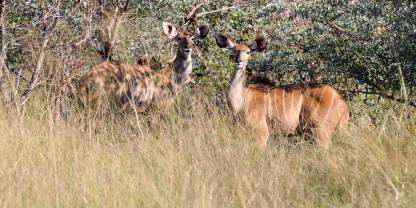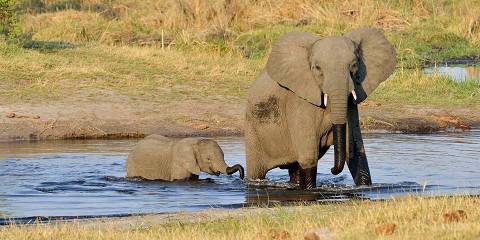Bwabwata National Park is one of the rising stars in Namibia’s national park portfolio. Located in the Zambezi Region (formerly Caprivi Strip), it was established by merging the former Caprivi Game Park and the Mahango Game Reserve. The creation of the park has turned around an area that once suffered heavy poaching. Wildlife numbers are recovering, and a visit here is also about escaping the well-trodden tourist trail.

-
Best Time To Go
- May to September (Animals are easier to see)
-
High Season
- July to October (It never gets crowded)
-
Size
- 6,100km² / 2,355mi²
-
Altitude
-
900-1,100m /2,953-3,609ft
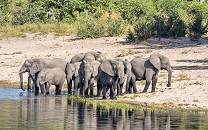 View Photos
View Photos
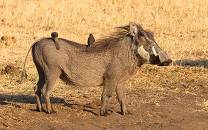 View Photos
+15
Photos
View Photos
+15
Photos
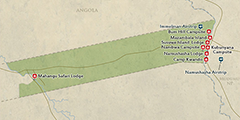 Open Map
Open Map
Pros & Cons
- Excellent wilderness ambience
- Little-visited, off-the-beaten-track park
- Wildlife numbers are increasing
- Few accommodations options inside the park
- Limited driving tracks
Wildlife
There isn’t a huge amount of wildlife in Bwabwata, but you might see elephant, buffalo and several antelope species, including greater kudu, roan, sable, red lechwe and the semi-aquatic sitatunga. All big cats are present, and lions are increasingly seen. There have even been sightings of wild dog.
More about Bwabwata’s wildlifeScenery
The park is bordered by the Okavango and Kwando Rivers. The main habitat is deciduous woodland with Zambezi teak and wild syringa trees. A scenic highlight is Horseshoe Bend, an oxbow lake with white sandy beaches that is surrounded by Zambezi teak. It’s popular with elephants.
Activities
Guided , which are usually organized by the lodges and camps in the area, are the main activity in Bwabwata. Self-guided, self-drive game drives are also possible. Boat excursions on the Kwando River are a great option for fishing, sightseeing or enjoying a .
Weather & Climate
It stays reasonably hot in Bwabwata for most of the year. The exception is during the heart of winter, which is the Dry season (May to October), when temperatures are cold despite the absence of rain. Bring warm clothing for early-morning at this time of year. October is one of the hottest months. In summer, which is known as the Wet season (November to April), fierce but short-lived storms accompany the consistently high temperatures.
More about the weather and climateBest Time To Visit
Animals tend to crowd around the park’s water sources during the Dry season (May to October). This is also when the undergrowth recedes, which makes wildlife much easier to spot. The months from May to September have the ideal conditions for visiting. Tolerating the stifling heat of the Wet season (November to April) is worthwhile if you’re a dedicated birder, as this is when migrant species are present.
More about the best time to visit
